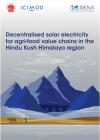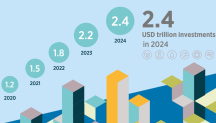

Decentralised Solar Electricity for Agri-food Value Chains in the Hindu Kush Himalaya Region
Newsletter
The communities inhabiting the mountainous areas of the Hind Kush Himalaya (HKH) region, which rely mainly on agriculture and farming for their food security and livelihoods, face increasingly severe impacts from climate change. Access to reliable and affordable energy is a key infrastructure input to improve agricultural productivity, reduce losses and capture value creation opportunities through processing and enhanced market access.
This report seeks to identify viable decentralised solar PV solutions to power key food value chains that are common across all eight countries of the HKH region – Afghanistan, Bangladesh, Bhutan, China, India, Myanmar, Nepal and Pakistan. It assesses the viability of solar PV solutions to meet energy needs at different nodal points in four selected food value chains of economic importance across the high-altitude areas of these countries, namely buckwheat, yak milk, potato and other vegetables.
The solar PV-based solutions suggested here have been designed based on proof-of-concept, deployed systems for similar farming processes. The viable mechanised equipment required to automate the production processes for each of the four food value chains have been discussed and presented based on their techno-commercial viability.




